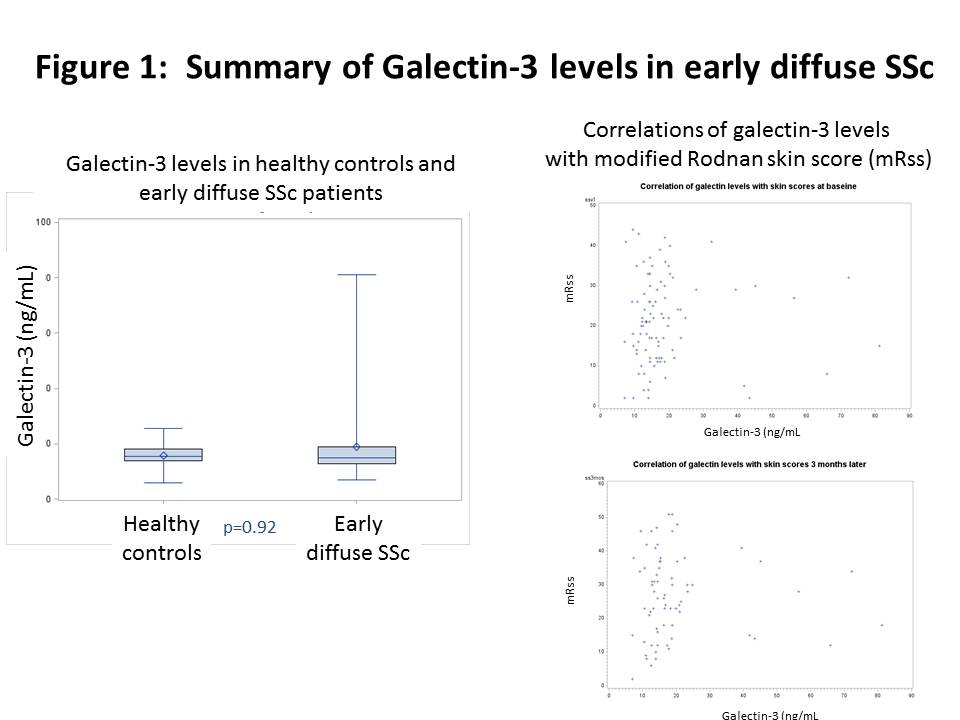Session Information
Session Type: Abstract Submissions (ACR)
Background/Purpose
Galectin-3 is a β-galactoside-binding animal lectin which is associated with inflammation, angiogenesis and fibrosis. Galectin-3 is upregulated in hepatic fibrosis, idiopathic pulmonary fibrosis and in the myocardium of heart failure patients. In heart failure it is a useful biomarker to predict mortality. In systemic sclerosis (SSc), one report (Koca 2013) suggests higher levels compared to healthy controls (HC). In a second study (Taniguchi 2012) suggested down-regulation in diffuse SSc and on subset analysis, the 6 early diffuse SSc patients had the greatest reduction in galectin-3 levels. They also reported a modest correlation between galectin-3 (r=0.45) and skin score. The objective of this study was to assess galectin-3 levels in very early diffuse SSc patients and the relationship to skin score and skin score change.
Methods
We identified patients with very early diffuse SSc who were seen for the first time in a dedicated Scleroderma Center between 1990 and 2010 and met the following criteria: (1) seen within 9 months of the first SSc symptom, (2) skin thickening proximal to the elbows and knees (or skin thickening with tendon friction rubs) and (3) had clinical follow-up with repeat skin scores at either 3 months, 6 month or both. HC were also identified. All SSc and HC first visit serum samples underwent ELISA testing (BGMedicine, Waltham, MA). Differences in galectin-3 levels between SSc and HC were assessed by nonparametric tests. Correlations with skin score at first visit, skin thickness progression rate (STPR) and absolute change in skin score at 3 and 6 months were assessed.
Results
 We identified 114 SSc patients who met all inclusion criteria. Of these, 94 had available samples taken at the same time as the initial skin assessment. The 37 HC were collected on the same day. All SSc patients and HC were Caucasian and 70% female. Mean age was 51 in SSc and 47 in the HC. Of the SSc patients, 50 had f/u at both 3 and 6 months, 20 at 3 months only and 22 at 6 months only. There was no significant difference in serum galectin-3 level between SSc patients and HC (p= 0.92), as shown in Figure 1. Baseline serum galectin-3 levels were not correlated with the skin scores taken at the same time (p=0.29) or STPR (p=0.71). Skin scores at 3 or 6 months follow-up also showed no correlation (p=0.43 and 0.76, respectively). There was a weak correlation with baseline galectin-3 levels and absolute skin score change at 3 months (r=0.26, p=0.02), but not at 6 month follow-up (p=0.78).
We identified 114 SSc patients who met all inclusion criteria. Of these, 94 had available samples taken at the same time as the initial skin assessment. The 37 HC were collected on the same day. All SSc patients and HC were Caucasian and 70% female. Mean age was 51 in SSc and 47 in the HC. Of the SSc patients, 50 had f/u at both 3 and 6 months, 20 at 3 months only and 22 at 6 months only. There was no significant difference in serum galectin-3 level between SSc patients and HC (p= 0.92), as shown in Figure 1. Baseline serum galectin-3 levels were not correlated with the skin scores taken at the same time (p=0.29) or STPR (p=0.71). Skin scores at 3 or 6 months follow-up also showed no correlation (p=0.43 and 0.76, respectively). There was a weak correlation with baseline galectin-3 levels and absolute skin score change at 3 months (r=0.26, p=0.02), but not at 6 month follow-up (p=0.78).
Conclusion
Contrary to smaller pilot studies suggesting galectin-3 is significantly different in SSc compared to HC, and may modestly correlate with skin score, our study did not confirm this. We used very early patients not on medications, and it may be that the previously reported differences in galectin-3 occur later in disease and represent fibrotic burden, or may be affected by medications.
Disclosure:
S. Moghadam-Kia,
None;
T. A. Medsger Jr.,
None;
R. T. Domsic,
None.
« Back to 2014 ACR/ARHP Annual Meeting
ACR Meeting Abstracts - https://acrabstracts.org/abstract/serum-galectin-3-levels-in-early-diffuse-systemic-sclerosis-and-the-relationship-to-skin-score-and-skin-score-change/
